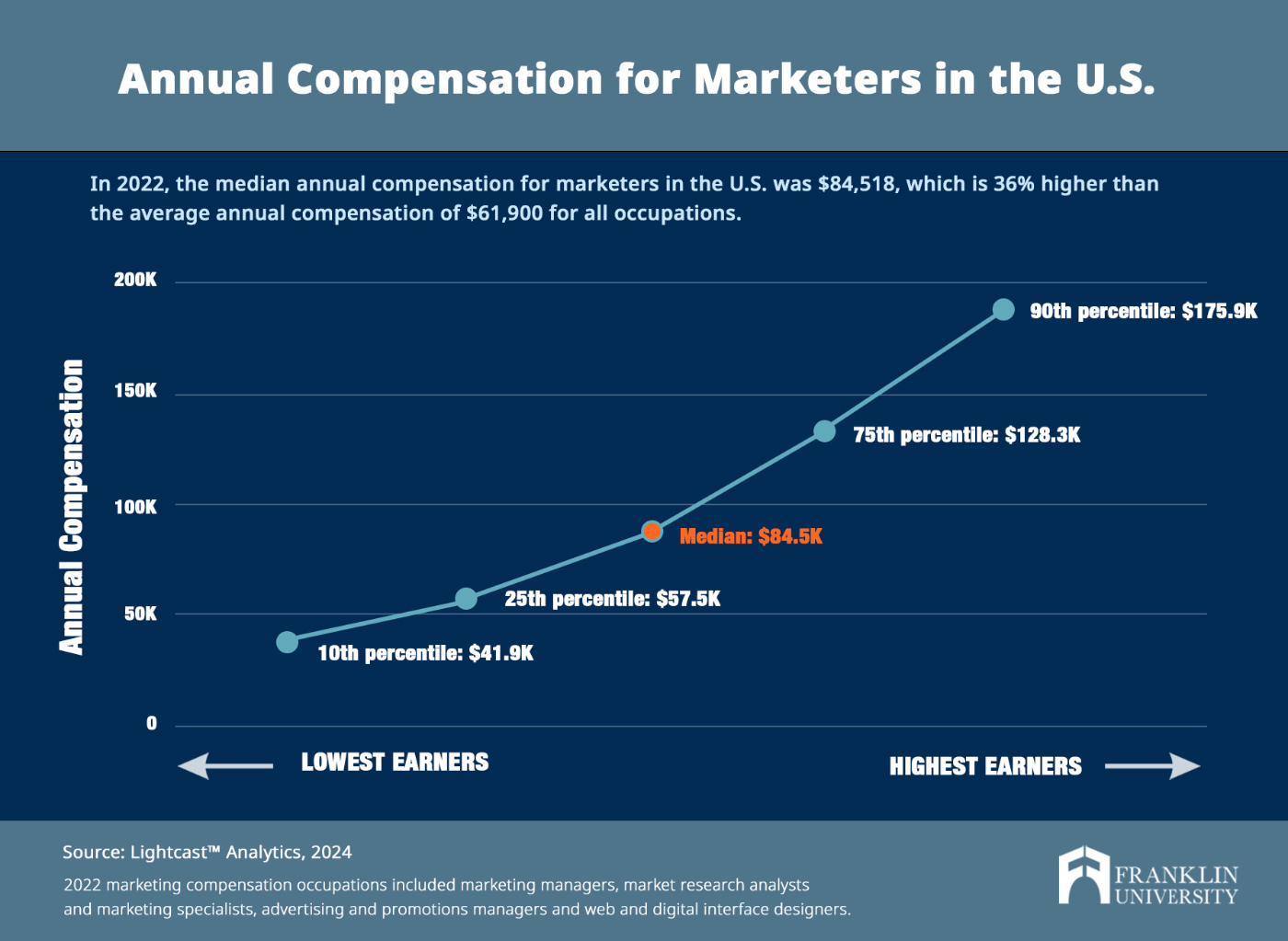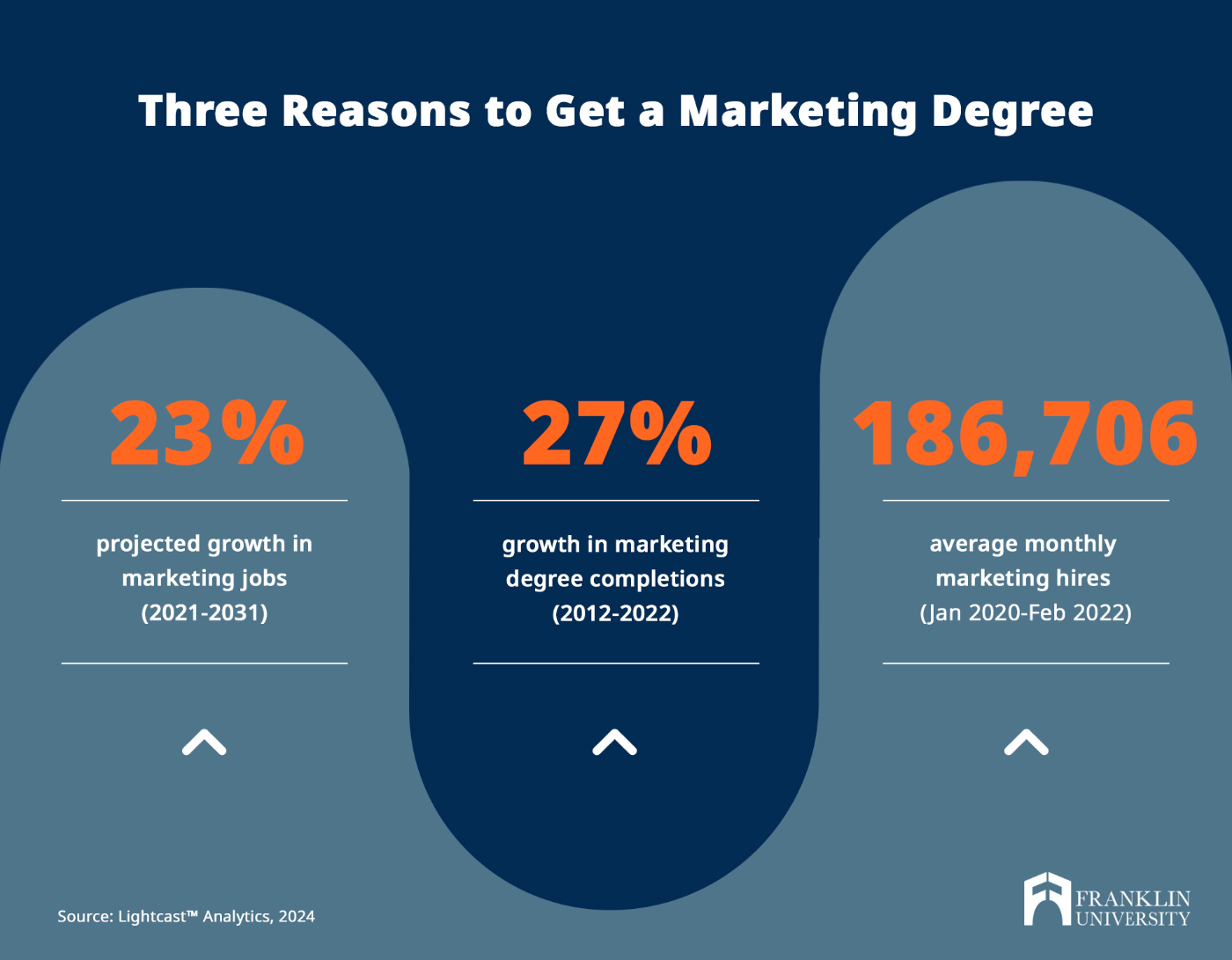Request Information
We're Sorry
There was an unexpected error with the form (your web browser was unable to retrieve some required data from our servers). This kind of error may occur if you have temporarily lost your internet connection. If you're able to verify that your internet connection is stable and the error persists, the Franklin University Help Desk is available to assist you at helpdesk@franklin.edu, 614.947.6682 (local), or 1.866.435.7006 (toll free).
Just a moment while we process your submission.

What Can You Do with a Marketing Degree?
If there’s one degree that covers business, social sciences, humanities, communication, digital and technology, it’s marketing. Earning a bachelor’s degree in marketing can help open up opportunities in an in-demand job market for qualified graduates who can think strategically, create relevancy and deliver measurable results.
Except for information technology, this widening field may be responsible for more career innovations than any other.
Think about it.
A generation ago, marketing professionals had no concept of social media. There was no Instagram, no Facebook, no X. And there was no need to work any of that into the marketing mix.
Today, marketing continues to evolve faster than ever.
Right now, there’s a massive need for savvy marketers who can position organizations to understand, leverage and capitalize on all the powerful things digital has to offer. It’s a big reason why, according to the U.S. Bureau of Labor Statistics, marketing jobs are growing faster than the national average for all occupations.
With a bachelor’s degree in marketing, you can develop and refine your skills in such key areas as:
- Artificial Intelligence (AI)
- Consumer Behavior
- Content Marketing
- Digital Marketing Strategy
- E-commerce
- Marketing Strategy
- Market Research and Analytics
- Promotion
- Search Engine Marketing (SEM)
- Search Engine Optimization (SEO)
- Social Media
What Jobs Can You Get with a Marketing Degree?
Earning a degree in marketing can help you add a variety of sought-after skills to your résumé, skills that can better prepare you for career paths with an excellent job outlook and earnings potential.
Lightcast™ Analytics predicts that the number of marketing jobs will increase by 23% by 2031, far faster than the national average of 2.8% for all occupations. As of 2022, the median salary for marketing degree holders is $84,518, far higher than the mean national salary for all occupations of $61,900.
“It’s long been recognized that in some fields, you need a degree,” says Bruce Ramsey, MSC, MBA, chair of the undergraduate marketing program of Franklin University in Columbus, Ohio.
“For example, in finance, you need an accounting degree. Unfortunately, that’s not been the case with marketing. Sometimes people migrate into it without a degree, but that always shows up in their performance and ability to advance.”
Jobs for Marketing Professionals (Median Earnings)*
- Marketing Manager ($65/hr)
- Sales Manager ($62/hr)
- Advertising/Promotions Manager ($59/hr)
- Web and Digital Interface Designers ($37/hr)
- Market Research Analyst ($32/hr)
- Public Relations Specialist ($32/hr)
*Source: Lightcast™ Analytics, 2024

One of the most exciting things about marketing is that job opportunities are available in various industries.
“Former students of mine are working for law firms doing marketing. Banks, too. And anyplace where relationship marketing is needed. Really, no industry is off-limits … if you’re creative, there’s work for you in advertising and promotion. If you’re analytical, there’s work for you in marketing research. If you’re some of both, there’s work for you - either on the agency side or on the client side,” Ramsey says.
While most marketing graduates will start at junior- and associate-level positions, advancement to mid- and upper-level management can be swift, depending on performance.
“We’re seeing more and more executives, including chief marketing officers (CMOs), come out of marketing,” says Ramsey. “CEOs have traditionally come more from the finance area, but that’s shifting because of the strategic aspects of marketing."
Marketing offers diverse job opportunities across industries, making it a field where creativity, analytical skills and performance can lead to swift career advancement and even top executive roles in today's evolving business landscape.
When it comes to paying for school, grants are among your best options. But do you know how to find them? Remove the guesswork by downloading this free guide
What Skills Will You Learn with a Marketing Degree?
It is essential to have a well-rounded skill set to be a good marketer. With a bachelor's degree in marketing, you'll develop various skills and learn how to integrate and apply them to become an effective marketer.
"You can think of the skills and knowledge needed to have a successful career in marketing as something like a pyramid," says Ramsey.
He goes on to explain how, at the base, it's crucial to have a good grounding in traditional marketing principles, such as consumer behavior, research and promotions.
From there, you must modernize your skill set by becoming proficient with digital tools and techniques. According to Ramsey, “Digital marketing is marketing now. Of course, the foundational principles still apply, but to succeed in the field, you must know about digital marketing techniques.”
Then, you have to develop your understanding of how marketing interacts with other business functions like sales and product management. At Franklin University, marketing students work in teams with students from different business majors to gain the insights needed to make educated marketing decisions that benefit all business functions.
The tip of the pyramid represents the most current in-demand skills.
"Right now, that includes effective use of AI to create content," says Ramsey. "We're building that skill set in our courses."
Since market trends are constantly changing, there will always be new skills to learn. Marketers must embrace these changes and utilize their foundations in marketing to continually adapt to this evolving industry.

Why Get a Marketing Degree?
Marketing is everywhere. Every industry, every type, and every size of business needs – and relies on – marketing for profit and success. So, is a marketing degree worth it?
Marketing, says Ramsey, is an interesting and growing field.
“Contrary to what people think, marketing is not limited to advertising and sales,” he says. “It’s also not limited to agency careers, though that is an option. There’s a whole other side we call the ‘client side,’ which means working for a company that uses marketing to generate business success.”
Ramsey says this is part of what draws students to become marketers.
“The majority of our adult-learner marketing students are not currently working in the field,” he explains. “A general marketing degree lets you participate in helping your organization figure out what to do to become more effective at what it does, whether that’s creating products or selling services.”
Marketing efforts can help organizations:
- Boost customer engagement
- Build brand awareness
- Drive organizational performance
- Increase the bottom line
- Influence purchasing behavior
- Promote goods and services
- Strengthen customer loyalty
None of that can happen in the best, most efficient manner without marketing.
From marketing theories to research and planning to smartly structured communication and strategy, a bachelor’s degree can prepare you to help your employer or organization maintain a competitive edge.

Are You Right for a Marketing Career?
Are you drawn to going back to school to earn a marketing degree? Generally, marketing attracts two types of people. Are you one - or both?
- The Creative Marketer: This includes writers, bloggers, journalists and others who like to express themselves through words. This personality type thrives on specific aspects of internet marketing campaigns, such as content creation, blogging, social media, advertising and promotion.
- The Analytical Marketer: This includes number crunchers, data geeks, predictive analytics and others who enjoy interpreting information and synthesizing findings. This person enjoys many of internet marketing’s most important skills, including understanding purchasing behavior, conducting market research, optimizing conversion through split rates and beta testing, and measuring digital efforts through web analytics and other tools.
Is Creativity or Analytics Your Thing?
“Most of our students are surprised that marketing is not just about being ‘big C Creative.’” Says Ramsey. “Sure, a big part of marketing is creativity, but not in the way people think; it’s more about having the ability to connect creativity to strategy and then being able to explain it. I call it ‘purpose-driven communication’ because a good idea is not worth anything unless you can articulate it in a compelling way.”
10 Traits Every Marketer Should Have
The 10 traits below are characteristic of every marketer:
- Creative
- Analytical
- Collaborative
- Computer-literate
- Detail-oriented
- Communicative
- Enthusiastic
- Confident
- Self-disciplined
- Flexible
If this sounds like you, the right marketing degree program can teach you the rest.
According to Ramsey and other marketing professionals, this industry requires a fair amount of ingenuity blended with problem-solving, communication and analytical skills.
Being a marketing major should give you a foundational marketing knowledge of the terminology, theories and frameworks used in this profession.
But the real challenge? Applying your knowledge in the real world. Find a marketing degree with faculty that are industry experts and coursework that incorporates real-world scenarios, ensuring you’ll be properly prepared for your career.
How Long Will It Take to Get a Marketing Degree?
A bachelor's degree in marketing typically takes four years to complete. However, if you already have a degree, you might not be inclined to return to campus and relive your university years. Fortunately, there are alternative options available.
Institutions like Franklin University offer 100% online classes and credit transfer options. An average student with transfer credits can complete an undergraduate degree in as few as 18 months.
Ready to earn your degree efficiently and flexibly? Discover more about Franklin's B.S. in Marketing Online.





